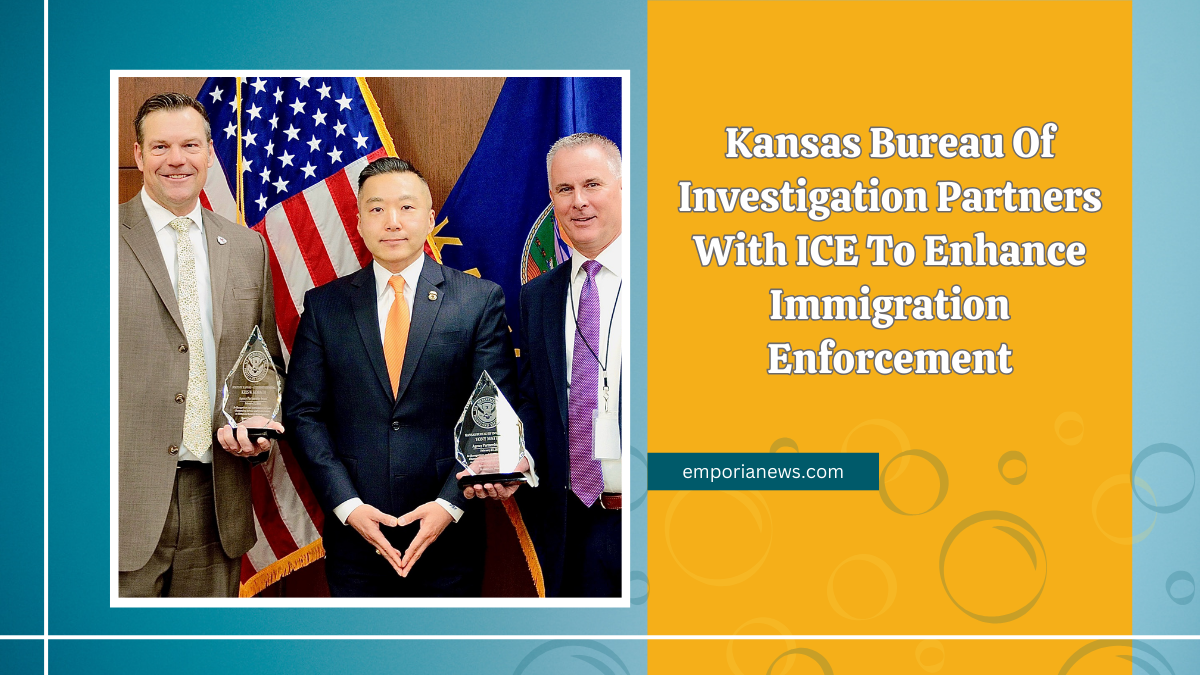In a significant policy development, the Kansas Bureau of Investigation (KBI) has formalized an agreement with the U.S. Department of Homeland Security (DHS) to collaborate with Immigration and Customs Enforcement (ICE) in bolstering immigration enforcement within the state.
This initiative positions Kansas as the second state, following Florida, to authorize state law enforcement agencies to actively participate in federal immigration operations.
Scope of the Agreement
Under the terms of the agreement, a select group of KBI agents will undergo specialized training provided by ICE. This training will empower these agents to:
- Arrest Individuals: Detain non-citizens residing unlawfully within the United States.
- Execute Warrants: Serve and enforce warrants pertaining to specific immigration infractions.
- Issue Detainers: Place holds on individuals suspected of immigration violations, ensuring their custody is maintained for ICE processing.
This collaboration is facilitated under Section 287(g) of the Immigration and Nationality Act, which permits state and local entities to enter into partnerships with federal agencies for immigration enforcement purposes.
Official Statements
Kansas Attorney General Kris Kobach emphasized the necessity of this partnership, stating, “Throughout Kansas, non-citizens who are dangerous criminals or gang members are routinely released back into the community. This agreement aims to halt that practice by ensuring such individuals are deported.”
KBI Director Tony Mattivi expressed support for the initiative, noting, “The KBI welcomes this additional tool to remove known criminal offenders from our communities.
This agreement will not alter our investigative priorities but will enable us to more swiftly achieve justice in cases we currently focus on—major violent crimes, offenses against children, and dismantling drug trafficking organizations.”
Operational Implications
The integration of KBI agents into federal immigration enforcement is designed to enhance public safety by targeting non-citizens involved in criminal activities. The specialized ICE training will equip KBI agents with the necessary skills and authority to:
- Identify and Apprehend Criminal Non-Citizens: Focus on individuals posing significant threats to community safety.
- Streamline Legal Processes: Utilize federal resources to expedite the removal of non-citizen offenders.
- Enhance Interagency Collaboration: Foster a cohesive approach between state and federal agencies in addressing immigration-related criminal activities.
| State | Agreement Date | Scope of Collaboration | Primary Objectives |
|---|---|---|---|
| Florida | Prior to Kansas | State law enforcement authorized to enforce federal immigration laws | Removal of non-citizen criminals and gang members |
| Kansas | February 17, 2025 | KBI agents trained to arrest, execute warrants, and issue detainers for immigration violations | Deportation of dangerous non-citizen offenders and enhanced public safety |
The collaboration between the Kansas Bureau of Investigation and Immigration and Customs Enforcement signifies a strategic effort to enhance public safety by targeting non-citizen individuals engaged in criminal activities.
By equipping state agents with federal enforcement capabilities, Kansas aims to ensure that dangerous offenders are effectively removed from its communities.
FAQs
What is the primary purpose of the KBI and ICE partnership?
The partnership aims to enhance public safety by empowering KBI agents to enforce federal immigration laws, specifically targeting non-citizen individuals involved in criminal activities.
How many KBI agents will participate in this program?
The exact number of agents has not been disclosed; however, only a limited number will receive specialized ICE training.
Will this partnership affect the KBI’s current investigative priorities?
No, the KBI will maintain its focus on major violent crimes, offenses against children, and drug trafficking organizations. This agreement provides an additional tool to address these priorities more effectively.




